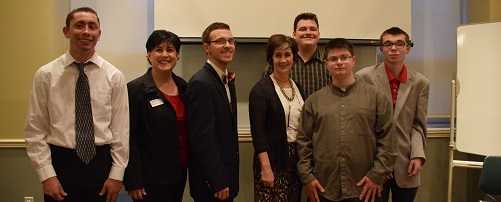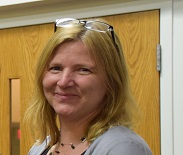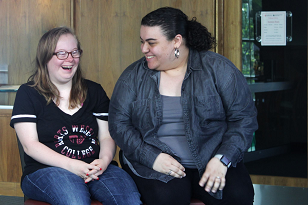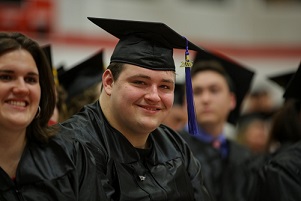Recent News
January 31, 2019BELL Program Featured in RBJ Article on "New & Renewed Workforce Opportunities"

Roberts' BELL program was recently highlighted in an article from the Rochester Business Journal entitled, "Local colleges offer new and renewed workforce opportunities". This article featured Kym Woodard, director of the BELL program, and Julianne Warren, graduate of the BELL program, who shared insight into how BELL students learn the basics of having a job and interacting with others in an educational setting. Per the article:
Across the county, Roberts Wesleyan College’s Bridge to Earning, Living and Learning program is geared for students who possibly never had a first job, and whose disabilities might be a hurdle in the way of that happening.
BELL is aimed at students 18 to 26 with intellectual disabilities, such as Down syndrome. Originally conceived as an employment training program when its funding came from a 2010 federal grant, its goals are broader now.

“Our goal has always been we’re educating for character, personal transformation,” said Kym Woodard, director of the BELL program, and that’s true for traditional Roberts students as well as BELL students.
For the last three years, the program has been funded through the BOCES II program and CP Rochester, which allows adult students to apply for federal student financial aid.
Some students come directly from high school, while others have been out for a bit, Woodard said. Students spend four semesters on campus, working in the areas of academics, social experience, vocation and functional academics, also known as independent living skills. Each has an academic coach who helps with time management skills. They also have peer mentors, who are other students who help them acclimate to campus.
“These develop into real friendships,” Woodard said.
The BELL students take the equivalent of 12 hours or four classes per semester, in many cases working alongside traditional students.
“Some might be academically fine, but struggle socially,” Woodard said, noting that some students have autism but are high-functioning. “We help them design their program and make course choices. Not everybody’s going to be in Biology 101.” A student might take a fitness class, for instance, as a first academic class.
Students are also required to find some sort of work on campus, which often can lead to something after they complete their certificate.
“A student who worked here in the library now works at the Gates Public Library,” Woodard said. “Another student loves people. She’s right for the helping professions.” A student who took a child development course and worked in the daycare at Roberts’ Pierce Memorial Church now has a job at the CP Rochester daycare center.
A survey the college conducted in 2016 of BELL graduates found 89 percent were engaged in either paid or unpaid work, or volunteer or internship programs.
Roberts has 12 students in BELL each year, with six in the first year and six in the second year.
“That’s the right size for our campus; we’re a small college,” Woodard said. Conversely, with an enrollment of 1,700, Roberts is the right size for students in the BELL program, with a limited number of faces and places to become familiar with.

A graduate of the BELL program, Julianne Warren, was scared to try it after a friend recommended it to her, but now she feels comfortable on campus. Warren, 24, of Spencerport, has Down syndrome and was home-schooled instead of going to a traditional high school. Afterward, she enrolled in cooking and baking programs at BOCES II.
“The Bell program helped me to be independent and connected to people and my community,” Warren said. She can be self-conscious about stuttering but found that a public speaking class she took at Roberts helped.
“It was kind of a challenge for me, but now I did it and now I don’t stutter that much,” she said. She particularly enjoyed the social events that were part of the BELL program, including an ice cream social and a “Beauty and the Beast” ball. With the help of job coaches, she gained help finding and then getting used to a job in the bakery at the Tops grocery store in Spencerport, Warren said. But she still feels connected to Roberts.
“I am a part of the Roberts College. I am part of their team,” Warren said. Woodard said the various colleges that have inclusion programs like Roberts’ for intellectually challenged students most likely put their own spins on providing opportunities for disabled students.

“This year the interest has exploded. If anything, there could be a need for more programs like this,” she said. “The word is getting out that college could be an option for a student with special needs, and parents are hearing that earlier. Don’t take it off the table. Explore it.”
For more news articles, you can take a look at our archive.